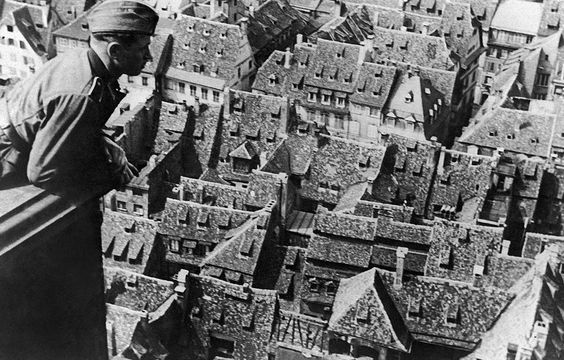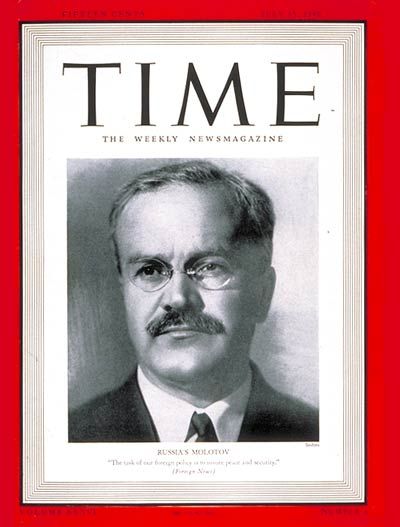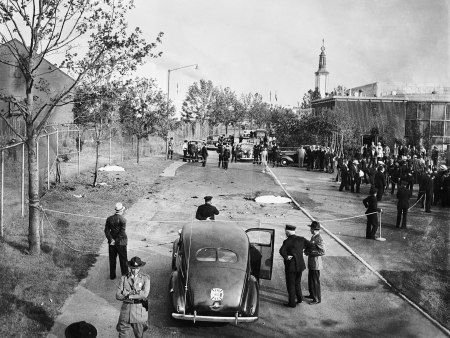Monday 15 July 1940
 |
| A German soldier stands in the cathedral of Strasbourg, 15 July 1940 (AP Photo). |
Today is often called the beginning of the "Brighton Blitz." The beaches are closed and mined, and civilians have been evacuated.
The Channel convoys remain a prime Luftwaffe target, and 15 Dornier Do 17s of KG2 attack Convoy "Pilot" in the Thames Estuary. Hurricane fighters rise to the defense and beat them off.
There also are attacks near the Scottish border by LG1. Among the targets are a Westland Aircraft factory and the airfields at Yeovil and St Athan RAF Station. RAF Nos. 213 and 92 Squadrons intercept and shoot down a Junkers Ju 88 of LG1.
JG26 begins transferring back to the French coast, winding up its period of rest and refit and indicating that serious operations against the British were about to begin.
During the day, the Luftwaffe loses a bomber, while the RAF loses four Hurricanes. Several of the RAF fighters crash on landing. Despite the weather, the RAF flies 470 sorties.
European Air Operations: The RAF sends Hampden bombers from Hemsworth airfield to raid Wilhelmshaven. The targets are the battleship Tirpitz, still under construction, and Admiral Scheer. The raid faces fierce anti-aircraft fire and the British lose four bombers, with many of the rest damaged, while missing the ships.
The Italians raid Gibraltar with S.82 bombers.
 |
| Hurricane Mk I of 17 Squadron, which crashed at RAF Debden on 15 July 1940. |
British 1199-ton freighter Bellerock hits a mine and sinks in the Bristol Channel. There are 17 crewmen that perish.
184-ton German (formerly Norwegian) tug Draugen hits a mine and sinks off Salhus, north of Bergen.
The Luftwaffe, apparently a Focke Wulf Fw 200 Condor, attacks and sinks 1282-ton Panamanian freighter Fossoula about 240 nautical miles northwest of Cape Finisterre, Spain. There are 32 survivors and 4 perish.
The Luftwaffe also bombs and sinks 2088-Polish freighter Zbaraz in the North Sea about 10 miles north of the Aldeburgh lightship. Everybody aboard survives.
The Luftwaffe catches 2855-ton British freighter Heworth about 10 miles south of Aldeburgh Light Vessel. The Heworth later sinks while in tow. Four crew perish.
The Luftwaffe bombs and sinks 1359-ton Irish freighter City of Limerick about 100 nautical miles west of Cape Finisterre, Spain. Of the crew, two perish.
The 2136-ton Estonian freighter Merisaar, which had been stopped and captured by U-99 (Kapitänleutnant Otto Kretschmer) on 12 July and sent to St. Lorient, is bombed and sunk by the Luftwaffe off Queenstown. The German prize crew winds up as POWs.
The 833-ton freighter Alpha is bombed and sunk southwest of Cornwall. Everybody aboard survives.
Minesweeper HMS Burlington is damaged by a mine at Aultbrea.
Royal Navy submarine Tetrarch misses with three torpedoes sent against U-57 near Bergen, Norway.
British cruiser HMS Esperance Bay, badly damaged by the Luftwaffe, makes it back to Plymouth Harbor with its cargo of gold being sent to Canada pursuant to Operation Fish.
The Luftwaffe lays mines in the Thames estuary.
Convoy HX 58 departs from Halifax, Convoy OB 184 departs from Liverpool.
French battleship Richelieu is commissioned.
Soviet submarine K-22 is commissioned.
British corvette HMS Godelia (K 72, Lt. Commander George V. Legassick) is commissioned.
 |
| Rita Hayworth on the cover of Life Magazine in pictorial "Picnic Time." Photo via Classic Cinema Images. |
At Malta, there is an air raid alert at first light, but it is just reconnaissance.
The Admiralty considers options for resupplying Malta, which has been isolated since France signed its armistice on 22 June. There are no good options, the best being the long way around the Cape of Good Hope and back up through the Suez Canal.
Western Front: Operation Ambassador, the brief commando landing on Channel Islands Guernsey and Little Sark, ends as the 140 commandos (less three left behind along with one destroyer crewman) re-board their destroyers at 03:00.
German/French Relations: Germany demands unrestricted military access through Vichy France. It also requests the use of French bases in Vichy North Africa. The French screw up their courage and reject these requests.
German/Romanian Relations: Hitler offers King Carol German protection only if it remains flexible about its frontiers.
Soviet/Baltic Relations: Pursuant to the vote administered by Soviet officials, Estonia, Latvia, and Lithuania join the Soviet Union. All of the votes are near-unanimous, of course.
 |
| Soviet Foreign Minister Molotov is the timely subject of Time Magazine's cover on 15 July 1940. |
Italian Military: The Duce Benito Mussolini orders his new Libyan commander Marshal Rodolfo Graziani to prepare an attack into Egypt on 8 August.
US Military: The US Marine Corps sends the 12th Marine Company to London to establish a Marine Detachment.
The first flight of the Stinson L-1 Vigilant observation aircraft. The aircraft is capable of flying at an extremely low speed of 31 mph and in fact, is said by pilots to sometimes fly backward in a headwind.
Colonel George S. Patton, Jr., one of the original tank innovators of World War I, is part of the newly formed US 2nd Armoured Division at Fort Benning, Georgia. The overall division is under the command of Major General Charles L. Scott, and Patton commands a brigade in addition to being in charge of training.
Palestine: Some bombs, presumably Italian, drop in the Haifa area. This is the area's first air raid and is aimed at a key oil pipeline from Iraq.
Luxembourg: The royal family sets sail from Lisbon on the light cruiser USS Trenton (CL 11).
Holocaust: Erich Mußfeldt joins the staff at Auschwitz.
British Government: The government announces that unemployment was 827,766 people in June, up 60,431 from May. The unemployment levels remain at historically low levels despite the increase.
German Government: The Reich informally annexes the province of Alsace-Lorraine, always a point of contention between France and Germany.
German radio agrees with Winston Churchill's 14 July speech that London indeed is now a legitimate military target.
British Homefront: The Home office bans anything that might interfere with air operations, including fireworks, kites, and balloons.
The ringing of church bells has been banned, and the rector of Old Bolingbroke, Lincolnshire receives four weeks in jail for violating this rule.
American Homefront: The Democratic National Convention convenes in Chicago, Illinois, poised to nominate Franklin Delano Roosevelt for an unprecedented third term.
Robert Wadlow, 22, who recently incurred an infected foot at an appearance, passes away. Wadlow is the tallest person in recorded human history.
 |
| Robert Wadlow. |
July 1940
July 1, 1940: Vichy France
July 2, 1940: Arandora Star
July 3, 1940: Operation Catapult at Mers El Kébir
July 4, 1940: Romania In Crisis
July 5, 1940: The Five Freedoms
July 6, 1940: Hitler's High Point
July 7 1940: Dakar And Ringo
July 8, 1940: Tea Rationing in England
July 9, 1940: Battle of Calabria
July 10, 1940: Battle of Britain Begins
July 11, 1940: "Nous, Philippe Petain"
July 12, 1940: Enter Laval
July 13, 1940: German Surface Raiders Attack!
July 14, 1940: Bastille/Mourning Day
July 15, 1940: Tallest Man Dies
July 16, 1940: Plans for Sea Lion
July 17, 1940: Burma Road Closed
July 18, 1940: FDR Runs Again
July 19, 1940: Last Appeal To Reason
July 20, 1940: First Night Fighter Victory
July 21, 1940: Soviets Absorb Baltic States
July 22, 1940: First RAF Night Fighter Victory
July 23, 1940: Invasion False Alarm
July 24, 1940: The Meknés Incident
July 25, 1940: Black Thursday for RAF
July 26, 1940: Capture The Duke?
July 27, 1940: What's Up, Doc?
July 28, 1940: Destroyers Pulled From Dover
July 29, 1940: Barbarossa On The Burner
July 30, 1940: Hitler Delays Sealion
July 31, 1940: Bloody Wednesday of Olkusz
2020





